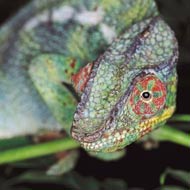
Study finds 3.6 per cent of pet reptiles die within first year
Some of the world's leading experts in reptile science have criticised new research into pet reptile death rates, branding it 'misleading'.
The study estimated that 3.6 per cent of reptiles kept as pets die within their first year in the home. However, experts say that the result may have been a consequence of 'flawed methodology'.
The exotic pet trade is subject to varying levels of national and international regulation, and the high mortality of traded animals has raised welfare concerns.
Mortality can occur at any stage of the trade chain from collector to consumer. However, very little information on the mortality rates exist - particularly in the pet owners home.
In the study, scientists from the University of Kent investigated mortality rates of reptiles amongst consumers using a specialised technique for asking sensitive questions (Randomised Response Technique), as well as direct questions.
They found that 3.6 per cent of snakes, chelonians and lizards died within one year of acquisition. Boas and pythons had the lowest mortality rates of 1.9 per cent and 69 per cent of chelonains had the highest at 28.2 per cent.
Criticising the study, the Animal Protection Agency (APA) said that the survey was largely reliant on 'honest declarations' from attendees at two events know to be associated with illegal wild animal dealing.
"The reptile markets at Doncaster and Kempton Park Racecourses were known to attract a large number of hardcore exotic animal keepers and dealers, who are not representative of the ordinary pet keeping public," said an APA spokesperson.
"The surveyors then applied the sample of answers from 256 market attendees to the population of pet reptiles currently kept in UK homes (independently estimated to be 1.1 million animals)."
Those interviewed for the study were asked questions like: "Of the X (number of reptiles) that you acquired over the last five years, how many died within the first 12 months?"
The APA believe that such a question requires not only some understanding, but also perfect recall and complete honesty to answer.
Elaine Toland, biologist and director of the APA said: “We greatly welcome good quality research into exotic pet mortality, but sadly we feel that the methodology was fundamentally flawed at the outset, and that the study is unhelpful to reptile welfare and conservation efforts.”
Clifford Warwick, one of the world’s most senior research scientists in reptile biology, added: “In my view, this study typifies the adage 'ask a silly question, get a silly answer’. I suspect that the main subscribers to the study’s conclusions will be those with subjective trade and hobby propagandist agendas.”
The study, captive reptile mortality rates in the home and implications for wildlife trade, is published in Plos One.



 RCVS Knowledge has welcomed Professor Peter Cockcroft as editor-in-chief for Veterinary Evidence.
RCVS Knowledge has welcomed Professor Peter Cockcroft as editor-in-chief for Veterinary Evidence.